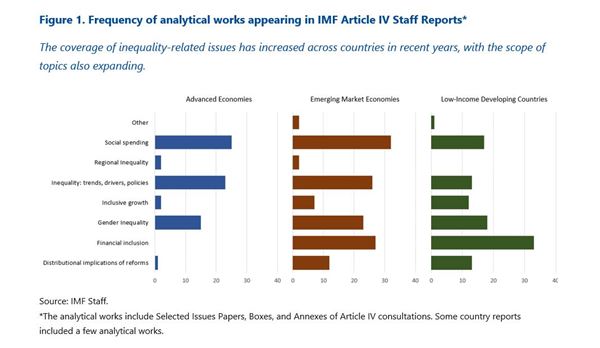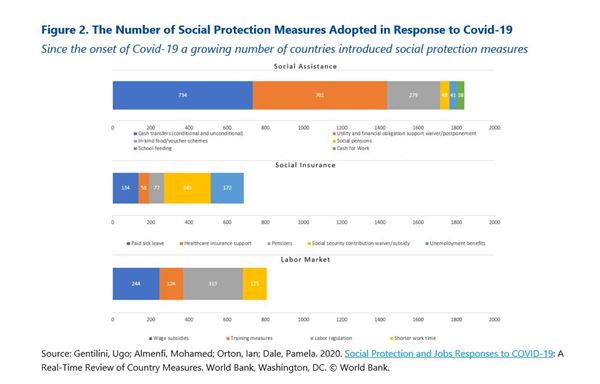Addressing the Divisive Inequalities Exposed by the Pandemic
How the IMF Helps Countries Tackle Inequalities
The Covid–19 pandemic is exacerbating inequalities across the globe, potentially undermining economic and political stability. Even prior to the pandemic, inequalities were high and rising in many countries across the globe and recent evidence has pointed to the long-term adverse implications of pandemics for inequality, with the potential for lasting scarring legacy, particularly for already disadvantaged groups.
The available evidence points to widening and persisting income gaps. The crisis has particularly hurt low-skilled workers and informal sector workers, which disproportionately include women and youth. The significant disruption to education has been especially detrimental for children from disadvantaged families, resulting in large learning losses with potentially worrying implications for their prospects. Furthermore, the pandemic has accelerated long-term trends, such as automation and digitalization, which can further reinforce inequality, even if beneficial for productivity and growth. The adverse fiscal implications of the crisis will also constrain the ability of governments to address these challenges, especially in low-income and fragile countries, which are expected to experience a more protracted recovery. Responding to these challenges will therefore require a coordinated global and national effort to avoid undermining progress towards achieving sustainable inclusive growth and the hopes and dreams of millions of people to escape from poverty.
Reflecting growing concerns among its membership about rising inequalities, the IMF has substantially scaled up its focus on inequality over the last decade. In particular, the IMF regularly produces analysis of inequality trends and supports countries in designing policies to tackle inequality. Inequality issues are now routinely addressed in multilateral and bilateral surveillance with countries where inequality levels or trends are seen as being “macrocritical”, i.e., important for macroeconomic stability and inclusive growth. Recent flagship publications have put inequality at the center of policy discussions, including the April 2021 and October 2017 Fiscal Monitors, October 2021 Regional Economic Outlook for Sub-Saharan Africa, October 2020 Regional Economic Outlook for Asia and Pacific, and G20 Note on Enhancing Access to Opportunities. Since 2015, the focus on inequality during bilateral country surveillance (so-called Article IV consultations) has also become more systematic, with analysis and advice on how to address inequality concerns. The number of countries where inequality issues were at the center of such consultations increased dramatically from 33 in 2015 to 52 by 2018.
The range of inequality topics covered has also expanded greatly. Policy discussions have gone beyond more traditional areas, such as fiscal redistribution and social spending, and included inclusive growth, inequality trends, drivers and policies; distributional implications of macroeconomic and structural policy reforms; regional inequality; gender inequality; and financial inclusion, among others (Figure 1). For example:
- In Myanmar (2016), IMF staff assessed the distributional implications of financial sector reforms, finding that financial liberalization can significantly boost economic growth, reduce poverty, and improve nationwide income distribution, but that the poor may benefit proportionally less than the better-off. This allowed staff to recommend policies more focused on disadvantaged groups, including micro-finance schemes. Other countries have also recently examined the impact of financial sector reform and financial inclusion on inequality, like El Salvador (2019).
- In Paraguay (2021), staff analysis showed that the pandemic had a disproportionately adverse impact on women, informal workers, and on the services sector. To mitigate such impacts, the government introduced two new social assistance programs and temporarily expanded the existing social protection program, complementing them with strong safeguards ensuring adequate coverage of lower-income groups. Other country analyses evaluate the distributional impacts of Covid–19, including for Chile (2021), and the role of social spending during the pandemic (The Bahamas,2021).
- In Nigeria (2019),the analysis focused on gender inequality and how reducing both regional and gender differences in access to education would boost productivity, decrease income inequality, narrow gender gaps in labor force participation rates and earnings, thus boosting long-term GDP growth. The role of gender inequality has also been covered in recent Article IV analyses including for Sweden (2021), Spain (2020), Mexico (2019), Japan (2019), and SierraLeone (2020).
- In Poland (2016), staff discussed regional income inequality and identified policies to increase productivity in the poorer regions of the East by supporting the reallocation of labor from lower-productivity agriculture to higher-productivity industry and service sectors. The analysis emphasized the importance of attracting investments to more disadvantaged regions by improving educational attainment and reducing skill mismatches, scaling up public infrastructure, and facilitating labor mobility. Studies of regional inequalities were also performed in other countries, such as the SlovakRepublic (2017), Ireland (2017), and Mexico (2019).
In the context of lending operations, the IMF has routinely emphasized the importance of protecting the poor and strengthening social spending in support of inclusive growth. Indeed, as recognized in the 2019 Strategy for IMF Engagement on Social Spending, such a focus is embedded in the design of Poverty Reduction and Growth Trust (PRGT)-supported programs, including through the use of “social and other priority spending” floors and other program conditionalities. About 90 percent of all PRGT programs have quantitative conditionality setting a floor on social spending, which also allow for increased spending over the program’s lifespan. The pandemic has exposed large gaps in social safety nets in many countries, especially low-income countries, and IMF country teams have supported governments in expanding coverage to better protect livelihoods during the pandemic (Figure 2).
The increased focus on inequality and social spending issues has reinforced the importance of strengthening country and IMF staff capacity to engage in this area and to collaborate with other development institutions with deeper sectoral expertise. Capacity development activities have been scaled-up to support knowledge in this area, including through a new online course on Inclusive Growth (IGx), which is open to all free of charge, and an internal training course on the design of social safety nets accompanied by a new country-level diagnostic tool. The IMF also established an internal Inequality Advisory Group to facilitate knowledge sharing both within the institution and with other development partners, including through joint seminars. To complement the Fund’s mostly macroeconomic focus on inequality with a wider structural focus in support of more granular policy advice, more formal arrangements have been put in place to promote collaboration with external counterparts, such as World Bank, ILO, UNICEF, WFP, DFID, ADB, and CEQ. For example, the most recent note from a special series on Covid-19 on gender equality and Covid-19 was prepared in collaboration with UNDP and UN Women.
Against the background of rising inequality in a pandemic setting, the IMF is committed to helping countries find appropriate policy solutions tailored to country-specific circumstances. To support countries deal with the impact of the COVID-19 pandemic, the IMF temporarily doubled access to its emergency financing facilities (including the Rapid Credit Facility and the Rapid Financing Instrument) and together with other pre-existing lending arrangements (many of which were scaled up) approved financing requests from 85 countries for the total amount of about $116 billion (as of August 9, 2021). The IMF provided additional support in the form of grants for debt relief under the Catastrophe Containment and Relief Trust (CCRT) and, together with the World Bank and the G-20, initiated the Debt Service Suspension Initiative (DSSI) for low-income countries. More recently, the IMF allocated Special Drawing Rights (SDRs) equivalent to US$650 billion, a historic decision that will provide a largest oxygen ball, a “shot in the arm for the global economy at a time of unprecedented crisis”. The SDR allocation will address the long-term global need for reserves, build confidence, and foster the resilience and stability of the global economy. Finally, at the onset of the pandemic, the IMF rapidly produced more than 100 special COVID-19 series notes providing advice to member countries in responding to economic challenges posed by COVID-19.
This enhanced financing will be key to ensure that the crisis does not reverse recent gains in poverty alleviation and to avoid disruptions to investments in human capital. Using such financing wisely will be critical to ensure access to quality basic public services, including education, health and social safety nets. Moreover, investments in traditional and digital infrastructure can help create jobs and support the recovery. Transparency in the use of the resources will be critical. While essential, this external financing will need to be complemented by ambitious domestic reform agendas, tailored to country circumstances, to mobilize domestic revenues, enhance spending efficiency, and promote green and inclusive growth. Increasing tax capacity will be crucial if countries, especially low-income countries, are to attain their development goals over the next decade.
Addressing the enormous challenges posed by the pandemic requires efforts not only to secure the recovery and ensure that the growth is sustainable and resilient but also to give everyone a fair shot at lifetime opportunities. A concerted and coordinated international effort will be needed to achieve these objectives. The IMF is committed to playing its role in this global effort.





